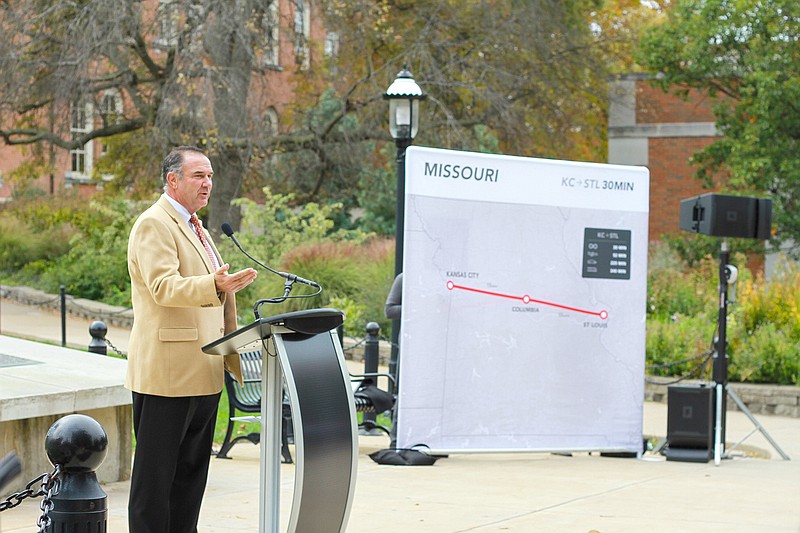Getting from Columbia to St. Louis or Kansas City in only 15 minutes is the future touted by supporters of Missouri's push for a hyperloop system - if the state can be the first to win a present-day equivalent of the Space Race.
Last century's competitive technological showdown between the United States and the Soviet Union created new innovations from humanity's first journeys beyond the bounds of Earth's atmosphere and orbit.
Missouri presently finds itself in a sprint with Saudi Arabia, India and the U.S. states of Texas, Ohio and maybe North Carolina to develop and profit from the development of technology to push ground transportation beyond the bounds of highway lanes and railroad tracks. New travel would include cross-state commute and cargo shipping times of only a few minutes.
The previously mentioned countries and other states are the competition named Monday by Missouri House Speaker Elijah Haahr for a request for proposals expected to be solicited by Los Angeles-based Virgin Hyperloop One.
That RFP may come as soon as the first week of November, Andrew Smith said last week. Smith is the vice chairman of the Missouri Blue Ribbon Panel on Hyperloop, which released its final report Monday on the work that would be needed to establish Missouri as a pioneer in developing hyperloop technology.
Presented in Kansas City, Columbia and St. Louis on Monday by the hyperloop panel's Chairman Lt. Gov. Mike Kehoe, state Treasurer Scott Fitzpatrick, Haahr and others, the report chiefly recommends:
The University of Missouri system partners with other universities in an International Tube Transport Center of Excellence;
Missouri be the site of a National Certification Track of up to 15 miles in length;
The state explore statutory and/or regulatory changes to make possible the public-private partnership that would be needed to pay for the estimated $300 million-$500 million certification track that "could be used to further validate the viability of the underlying technology."
The report estimates the total cost to build a hyperloop system across Missouri "ranges from $30 million to $40 million per mile, or approximately $7.3 (billion) to $10.4 billion total."
The economic benefits of investing in research and development that could make Missouri a national and global technological example to follow - and connect future interstate sections of hyperloop to - are also outlined in the report, including "an estimated annual economic impact of $1.67 (billion)-$3.68 billion;" the creation of 7,600-17,200 new jobs; increased real estate values around hyperloop portal locations; increased local and state tax revenues; strengthening of industries; and reducing greenhouse gas emissions, specifically carbon dioxide.
"This project is going to have spin-offs" of technologies not yet envisioned, UM System president Mun Choi said Monday, citing things like microprocessors, high-speed computing and solar cells that were only developed after NASA's foray into the Space Race.
The report does not suggest specific possible locations for the proposed hyperloop certification track, though Smith said last week that St. Louis and Kansas City are "actively working on potential locations."
He said seeing Virgin Hyperloop's RFP will be needed to establish a timeline of creating a public-private partnership, and there's not yet a formal agreement in place with other universities listed that could be part of the center of excellence to study and develop hyperloop technology.
Assuming Missouri wins Virgin's RFP - Smith expected a decision in early 2020 - he anticipated a full cross-state route could be built seven to 10 years from now.
There are a few other companies globally besides Virgin Hyperloop that are exploring the technology, but Smith said Virgin has the financial backing and technical expertise to be able to pull it off: "This is our best, clearest shot at making this happen."
Missouri's hyperloop panel worked with Virgin Hyperloop One and toured the company's Mojave Desert test track in Nevada, and had a feasibility study done by Kansas City's Black & Veatch engineering firm.
The proposed certification track in Missouri would be built in 1- to 3-mile segments at a time, "to permit initial testing of core technology components" - including vacuum tubes, high speed switches, airlocks, and magnetic levitation and propulsion systems - before reaching the full 12- to 15-mile length necessary for pods inside the system to approach their maximum velocity, "a key requirement in any certification process."
A track of that length would be many times longer than current testing facilities elsewhere.
"It'll be something, if Missouri is first, that will be a game-changer for the state," Fitzpatrick said Monday.
Related:

